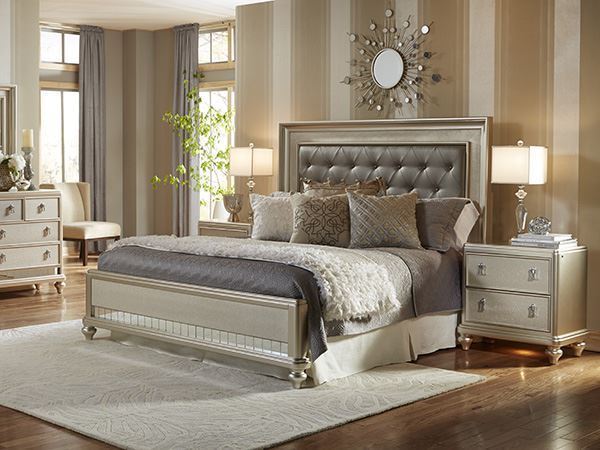Creating a bedroom that balances style, functionality, and comfort starts with choosing the right furniture. Here’s a comprehensive guide to the essential pieces of bedroom furniture, their purposes, and tips for selecting the best options for your space.
1. The Bed: The Centerpiece of Your Bedroom
Choosing the Right Bed Frame
The bed is the focal point of any bedroom. When selecting a bed frame, consider the size of the room and the bed’s dimensions. Common sizes include twin, full, queen, and king. The bed frame can range from a simple platform style to elaborate designs with headboards and footboards. Material choices, such as wood, metal, or upholstered options, can dramatically influence the room’s aesthetic.
Mattress Selection
A good mattress is crucial for a restful night’s sleep. Consider factors such as firmness, material (memory foam, innerspring, latex), and any specific needs you might have (e.g., back support, cooling features). Mattress toppers and protectors can also enhance comfort and longevity.
2. Nightstands: Practical and Decorative
Purpose and Placement
Nightstands provide essential storage and a convenient surface for items like lamps, alarm clocks, and personal belongings. Ideally, nightstands should be placed on either side of the bed, at a height that aligns with the mattress to ensure easy access.
Design and Functionality
Choose nightstands that complement your bed’s style. Options range from sleek modern designs to traditional wooden pieces. Consider functionality: some nightstands come with drawers or shelves for additional storage.
3. Dressers and Chests: Essential Storage Solutions
Types of Dressers
Dressers come in various sizes and styles. A standard dresser typically has multiple drawers and provides ample storage for clothing. For smaller rooms, a low-profile dresser can offer storage without overwhelming the space.
Chests and Armoires
Chests of drawers are similar to dressers but often taller and narrower. Armoires can serve as both storage and a wardrobe, with hanging space for clothes and additional drawers. These are especially useful in rooms without built-in closets.
4. Wardrobes: Stylish Storage Options
Standalone Wardrobes
For rooms lacking built-in closets, standalone wardrobes are an excellent solution. They come in various styles, from sleek and modern to traditional with detailed carvings. Wardrobes can include hanging space, shelves, and drawers, providing versatile storage solutions.
Custom Closet Systems
If you have the space and budget, consider a custom closet system. These systems can be tailored to your specific needs, incorporating shelves, drawers, and hanging areas to maximize storage efficiency.
5. Dressers and Vanities: A Touch of Glamour
Vanity Tables
Vanity tables are ideal for applying makeup and organizing beauty products. They typically feature a mirror and ample drawer space for storing cosmetics, hair tools, and other personal items. Choose a vanity that complements your bedroom’s décor and offers enough space for your needs.
Multi-Function Furniture
In smaller bedrooms, look for multi-function furniture that combines storage and vanity features, such as a dresser with a mirror or a bench with hidden storage.
6. Benches and Ottomans: Versatile Additions
Functional Seating
Benches and ottomans provide additional seating and can also serve as stylish accent pieces. Place a bench at the foot of the bed for a practical touch or use an ottoman as a footrest and additional storage.
Design Considerations
Choose designs that match the overall theme of your bedroom. Upholstered options add a touch of luxury, while wooden or metal pieces offer a more modern or rustic look.
7. Headboards: Adding Style and Comfort
Types of Headboards
Headboards are both functional and decorative. They can be upholstered for comfort, made of wood for a traditional look, or crafted from metal for a modern touch. Headboards can also include built-in storage or lighting features.
Choosing the Right Style
Select a headboard that complements your bed frame and room décor. Consider the height and width of the headboard in relation to your bed and the overall room size.
8. Lighting: Setting the Mood
Bedside Lamps
Bedside lamps provide necessary lighting for reading and creating a cozy ambiance. Choose lamps that match your nightstands and offer adjustable brightness.
Overhead and Accent Lighting
In addition to bedside lamps, consider overhead lighting and accent lighting. Chandeliers, pendant lights, and ceiling fixtures can enhance the room’s overall design. Accent lighting, such as wall sconces or LED strips, can add a touch of elegance.
9. Mirrors: Enhancing Space and Light
Types of Mirrors
Mirrors can make a room feel larger and brighter. Consider a full-length mirror for dressing or decorative mirrors that serve as focal points. Frameless mirrors can create a sleek look, while ornate frames add a touch of sophistication.
Placement Tips
Place mirrors strategically to reflect light and views. Avoid placing them directly opposite the bed, which can be unsettling for some people.
10. Accent Pieces: Personalizing Your Space
Artwork and Decor
Incorporate artwork and decorative items that reflect your personality and style. Wall art, photos, and decorative objects can add color and character to your bedroom.
Textiles and Rugs
Textiles, such as bed linens, throw pillows, and rugs, can enhance the comfort and style of your bedroom. Choose fabrics and patterns that coordinate with your furniture and overall décor theme.
Conclusion
Choosing the right bedroom furniture involves balancing style, function, and comfort. By selecting quality pieces that suit your needs and preferences, you can create a bedroom that is not only beautiful but also a restful retreat. Consider each element carefully, from the bed and storage solutions to lighting and décor, to design a space that reflects your personal taste and enhances your daily life.



